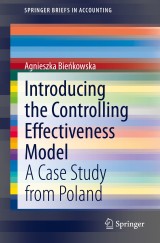Details

Introducing the Controlling Effectiveness Model
A Case Study from PolandSpringerBriefs in Accounting
|
53,49 € |
|
| Verlag: | Springer |
| Format: | |
| Veröffentl.: | 13.05.2021 |
| ISBN/EAN: | 9783030738082 |
| Sprache: | englisch |
Dieses eBook enthält ein Wasserzeichen.
Beschreibungen
Focusing on the controlling management method, this book considers the conditions that must be met within a given organization in order for controlling to achieve the desired level of product quality, allowing it to enhance the performance of the organization as a whole.<br> The book describes the influence of each identified group of conditions on the Controlling Effectiveness Model and includes empirical research, conducted at various organizations operating in Poland, that verifies its theoretical assumptions. In terms of analyzing the empirical data, description and statistical inference methods were used, such as students’ t-test scores for independent samples, non-parametric r-Pearson correlation and linear regression analysis. Additionally, the book includes moderators and mediators executed using Process Macro for SPSS by Hayes, and multigroup path analysis executed using SPSS AMOS.
<p>Chapter 1. Introduction.- Chapter 2. Controlling quality and effectiveness - Controlling Effectiveness Model.- Chapter 3. Factors influencing the functioning of controlling.- Chapter 4. Research methodology.- Chapter 5. Conclusions.</p>
<p><b>Agnieszka Bieńkowska </b>is the Vice-Rector of Wrocław University of Science and Technology (Poland) and Professor of WUST at the Faculty of Computer Science and Management, Department of Management Systems and Organizational Development. Her research areas are focused on modern methods of management (especially controlling) and HRM solutions in organizations.</p>
Focusing on the controlling management method, this book considers the conditions that must be met within a given organization in order for controlling to achieve the desired level of product quality, allowing it to enhance the performance of the organization as a whole.<br>The book describes the influence of each identified group of conditions on the Controlling Effectiveness Model and includes empirical research, conducted at various organizations operating in Poland, that verifies its theoretical assumptions. In terms of analyzing the empirical data, description and statistical inference methods were used, such as students’ t-test scores for independent samples, non-parametric r-Pearson correlation and linear regression analysis. Additionally, the book includes moderators and mediators executed using Process Macro for SPSS by Hayes, and multigroup path analysis executed using SPSS AMOS.
Offers a comprehensive analysis of the benefits from using controlling as a management method Includes case studies from Poland Specifies the determinants that allow controlling to have the greatest impact on the performance of the organization Approaches controlling from a theoretical standpoint


















